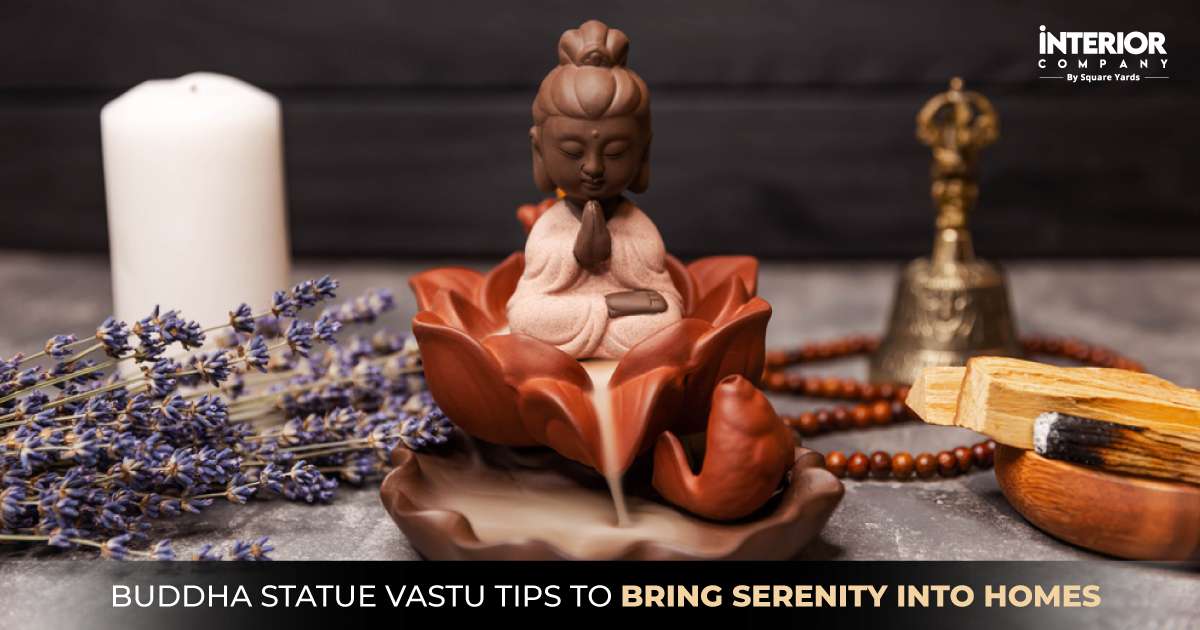The ancient sciences of architecture Vastu Shastra have a lot to say about the precise placement of the Buddha statue and their postures at home that can optimise the flow of energy and enhance positivity.
Each traditional pose has a specific hand gesture, called a “Mudra”, representing the essential aspects of Gautam Buddha’s life. Below is a guide to different forms of the Buddhist Mudras and their placement in the homes.
The Blessing Buddha Idol at Home Entrance
Source: Pinterest
The protection or blessing Buddha statue can be easily identified by a raised hand that acts as a shield to ward off negative vibes. The second hand offers peace and overcomes fear to keep disruptive thoughts at bay.
Placement of Buddha Idol- You can place a protective Buddha statue, according to Vastu, at the entrance of the homes to keep unwanted energies away and radiate positive vibes.
The Sleeping Buddha Vastu direction in Home
Source: Pinterest
The reclining or sleeping posture of Gautam Buddha, which has one hand supporting his head, represents the benevolence of Shakyamuni Buddha. It symbolises the last moments of Buddha’s mortal life, where he releases himself from the endless cycles of rebirth.
Placement in Home- The ideal Buddha statue, as per Vastu, should be positioned in the west direction to seek internal harmony.
Also Check: Eye-Catching Vastu Colours for Your Living Room
The Meditating Buddha Vastu direction for Home
Source: Pinterest
According to Feng shui and Vastu Shastra, the meditating Buddha artefact lends a positive energy to the environment. In this mudra, the Lord Buddha is seen sitting with both hands in the lap, face up, and the legs crossed, forming a lotus position. The silhouette of the Buddha statue is shaped more or less like a triangle, which depicts stability.
Placement of Meditating Buddha Vastu in Home- It should be set up in the prayer room or the northeastern corner of the home, along with the water element, to instil a laser-sharp sense of focus.
The Bhumisparsha Buddha Statue as per Vastu
Source: Pinterest
This Lord Buddha idol posture is known as “Calling The Earth to Witness” and represents the moment of enlightenment. In this pose, the Buddha has legs crossed, the left hand in the lap, while the other points towards the ground.
As the story upholds, Gautam Buddha had been meditating for years when the demon Mara (demon of Illusion) tried to frighten him. Buddha meditated all night to overcome the temptation and reached out his right hand to touch the Earth Goddess to witness his enlightenment.
Placement of Buddha Statue in Home Vastu Tip- This is the most popular pose that represents eternal wisdom and should be seated at the east or the centre of your residence.
The Praying Buddha Statue for Home Vastu
Source: Pinterest
Wondering about the praying Buddha Vastu direction in your home? A Buddha with his folded hands in prayer represents devotion and spirituality. This ideal pose can be placed in the living room, dining space, and close to the main entrance.
Buddha Statue Vastu Tip- According to Vastu Shastra, the Buddha statue should never be placed below eye level as it is considered inauspicious in homes.
Gautam Buddha Statues for the Garden
Source: Pinterest
For your balconies and garden, choose the buddha statue as per Vastu to create a Zen space. The Meditating Buddha near the water body and flowering plants represent spiritual growth and rejuvenation.
Placement of Buddha Statue at Home Vastu Tips- Lord Buddha needs to be seated above the ground, facing in the eastern direction of the house to bring good luck and prosperity.
Vitarka Mudra Buddha statue Vastu and its placement
Source: Pinterest
This statue in Vitarka mudra, where the thumb and index fingers form a circle, signifies wisdom, understanding, and fulfilling destiny. It depicts a specific moment in the life of the Buddha, namely, the first sermon after reaching Enlightenment.
Placement of Buddha Statue in Vastu- The idol is kept in the study, in a library or at an office desk facing east direction to attain excellence.
Laughing Buddha Vastu direction for Good Luck
Source: Pinterest
The laughing Buddha is believed to be a 10th-century Chinese monk named Budai. A symbol of the Feng Shui element, the statue of the Laughing Buddha brings prosperity and overcomes hurdles to lead happiness in life.
Laughing Buddha Statue at Home- As per the Vastu Shastra, the laughing buddha idol should place in the east direction for enhanced harmony and good fortune.
Paintings of Buddha at Home Vastu Direction
Source: Pinterest
Lord Buddha’s paintings exude eternal peace and positivity in the home. These artworks are available in various mudra positions that signify courage and knowledge while fostering a culture of well-being. Lord Buddha sitting in the Bhumisparsha position is a symbol of enlightenment that brings serenity and prosperity into the house.
Placement of Buddha in Vastu Shastra– Paintings of Buddha should be placed at the main entry in the south corner of your home to channelise blissful energies.
Benefits of Buddha Statue as per Vastu in Homes
Gautam Buddha is the epitome of peace, enlightenment, and tranquillity. Buddha statues add aesthetics to home decor and bring wisdom, good fortune, luck, and prosperity. Its benefits include:
- Elevated psychological health and harmony in the home
- The constant flow of positive vibes inside the house
- The placement of Buddha statues as per Vastu Shastra enhances the happiness quotient in the living and working spaces.
- Keeping paintings and idols in the correct room and direction can manifest many positive results in the homeowner’s life.
Bring Buddha idols to home and transform your thoughts and lives to lead a pleasant and motivated life. Consult the experts at Interior Company to know more about the Vastu and Feng Shui tips for your home.
* Images used are for illustration purposes only. Interior Company does not hold any copyright to the images unless mentioned explicitly.
